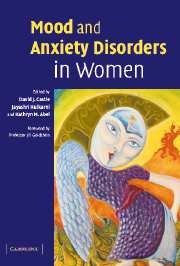Book contents
- Frontmatter
- Contents
- Contributors
- Preface
- Foreword
- 1 Pubertal development and the emergence of the gender gap in mood disorders: A developmental and evolutionary synthesis
- 2 Borderline personality disorder: Sex differences
- 3 Substance use and abuse in women
- 4 Anxiety disorders in women
- 5 Posttraumatic stress disorder in women
- 6 Domestic violence and its impact on mood disorder in women: Implications for mental health workers
- 7 Depression in women: Hormonal influences
- 8 Anxiety and mood disorders in pregnancy and the postpartum period
- 9 Pharmacological treatment of anxiety and depression in pregnancy and lactation
- 10 Bipolar affective disorder: Special issues for women
- 11 Mood and menopause
- 12 Anxiety and depression in women in old age
- Index
9 - Pharmacological treatment of anxiety and depression in pregnancy and lactation
Published online by Cambridge University Press: 13 August 2009
- Frontmatter
- Contents
- Contributors
- Preface
- Foreword
- 1 Pubertal development and the emergence of the gender gap in mood disorders: A developmental and evolutionary synthesis
- 2 Borderline personality disorder: Sex differences
- 3 Substance use and abuse in women
- 4 Anxiety disorders in women
- 5 Posttraumatic stress disorder in women
- 6 Domestic violence and its impact on mood disorder in women: Implications for mental health workers
- 7 Depression in women: Hormonal influences
- 8 Anxiety and mood disorders in pregnancy and the postpartum period
- 9 Pharmacological treatment of anxiety and depression in pregnancy and lactation
- 10 Bipolar affective disorder: Special issues for women
- 11 Mood and menopause
- 12 Anxiety and depression in women in old age
- Index
Summary
As detailed in Chapter 8 of this volume, pregnancy and the postpartum period may be a stressful and turbulent stage of a woman's life, and is a period of risk for mood and anxiety disorders. Such disorders might require pharmacotherapy. However, the efficacy and safety of pharmacological treatments during pregnancy and lactation require special consideration. Many psychotropic medications have been associated with some adverse effects. These vary in terms of clinical significance. Pregnancy and lactation are times of increased vulnerability to risks associated with pharmacological treatment.
Medications of various classes are routinely administered to pregnant and lactating women. In a study of prescription forms in France, 74.2% of pregnant women had at least one prescription during pregnancy (Haramburu et al., 2000). In a Norwegian study a retrospective questionnaire given to 885 mothers investigated drug utilisation in breastfeeding women and found that 69% of mothers had taken at least one pharmaceutical agent in the 4-month period postpartum. Agents from a wide range of therapeutic classes were taken with the most commonly used agents being analgesics/antipyretics (32%), dermatologicals (19%) and oral contraceptives (13%). Psychotropic agents were taken by only 1.1% of mothers (Matheson et al., 1990).
The decision to use pharmacotherapy, as well as the structure of any treatment schedule during pregnancy and lactation must be made by balancing the risks and benefits of treatment specific to the needs of the individual.
Keywords
- Type
- Chapter
- Information
- Mood and Anxiety Disorders in Women , pp. 163 - 184Publisher: Cambridge University PressPrint publication year: 2006
- 1
- Cited by

